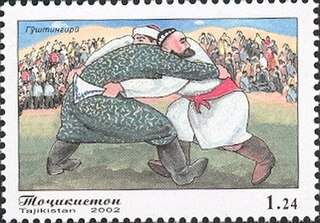 | |
 | |
| Focus | Wrestling |
|---|---|
| Famous practitioners | Gilgamesh, Kozhomkul, Ivan Poddubny, Qajymuqan |
| Olympic sport | No |
Belt wrestling is a form of wrestling that is one of the oldest historically recorded sports. It involves two belted contestants aiming to take each other over by grappling with a belt. [1] There are hundreds of national belt wrestling styles, but contemporary most widespread and internationally competed are Alysh and Kurash, developed by the previously nomadic Turkic peoples of Central Asia. United World Wrestling recognized Alysh wrestling as the primary international belt wrestling style. It is regulated globally by the International Federation of Wrestling on Belts Alysh, the sport's governing body. Although the sport has been practiced for millennia, and local championships were held in various places of the world, it was until 2001 when Bayaman Erkinbayev started its international version, and it was called "Alysh". Until 2005, Rif Gaynanov and Bayaman Erkinbayev developed this style together, and then the ways separated. Two different styles appeared named "Alysh" and "Kurash" belt wrestling. Since then, the sport has been included in the 2013 Summer Universiade program, recognized by the Asian Olympic Council, and contested at the Asian Games and Asian Indoor Games. The sport's executives struggle to promote it to the level of an official Olympic sport.